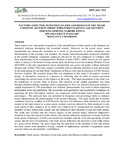| dc.contributor.author | Mwangi, Grace | |
| dc.date.accessioned | 2021-05-06T13:18:02Z | |
| dc.date.available | 2021-05-06T13:18:02Z | |
| dc.date.issued | 2018 | |
| dc.identifier.issn | 2411-7323 | |
| dc.identifier.uri | http://hdl.handle.net/123456789/4636 | |
| dc.identifier.uri | https://www.sagepublishers.com/index.php/ijssme/article/view/14 | |
| dc.description.abstract | There seems to be widespread recognition of the rational base of trade unions in the literature on industrial relations throughout the twentieth century. However, in the recent years, union membership has drastically dwindled as a result of privatization of public enterprises and liberalization of the economy. For instance, the former telecommunication employees absorbed in the mobile telephone companies cannot be allowed by the new employers to continue with their membership in the Communications Workers Union (CWU). Other sectors are not spared either. Contrary to the belief of many unions here, the Kenya Local Government Workers Union (KLGWU) is the only organisation whose membership cuts across all grades without industrial disquiet and conflict. The study sought to establish factors affecting intention to join and remain in the trade unions by security firms’ employees in Kenya with special reference to G4S Security Services Limited. The research design that was employed in this study is descriptive research design. A descriptive research is a process of collecting data in order to answer questions concerning the current status of the subjects in the study. The target population of the study was the employees of security firms in Kenya. The selection of the sample population was done through stratified random sampling where a proportion of 10% was selected from each stratum: a sample population of 158 respondents was selected. Questionnaire was used to obtain important information about the population. The researcher used qualitative and quantitative techniques in analyzing the data. Descriptive analysis was employed; which includes mean, frequencies and percentages. The analyzed data was presented in frequency and percentage tables to enhance easier interpretation and understanding of the research findings. The study found that economic conditions faced by workers in G4S Security Services Ltd influences their intention to join and remain in the trade unions to a great extent, workers were not allowed by their employer to join trade unions if they wanted to do so, there was a high level of victimization for employees who intended or have joined trade unions and this influenced their intention to join the trade unions. The study also revealed that the various aspects of job rotation highly influence employee’s intention to join and remain in trade unions; job rotation influences employees to resign from the trade unions. Employees of G4S were found to be familiar with the work and operations of trade unions and the level of familiarity with trade unions influences the decision to join trade unions to a great extent. Further, the study found that the indicators of the intention to join and remain the trade unions were member’s loyalty, number of applications, member’s resignation, union activism behavior and members’ contribution. | en_US |
| dc.language.iso | en | en_US |
| dc.publisher | International Journal of Social Sciences Management and Entrepreneurship | en_US |
| dc.subject | Trade unions, Intention to join trade union and Human resources management. | en_US |
| dc.title | Factors Affecting Intention to Join and Remain in The Trade Unions by Security Firms’ Employees in Kenya: G4s Security Services Limited, Nairobi, Kenya | en_US |
| dc.type | Article | en_US |

